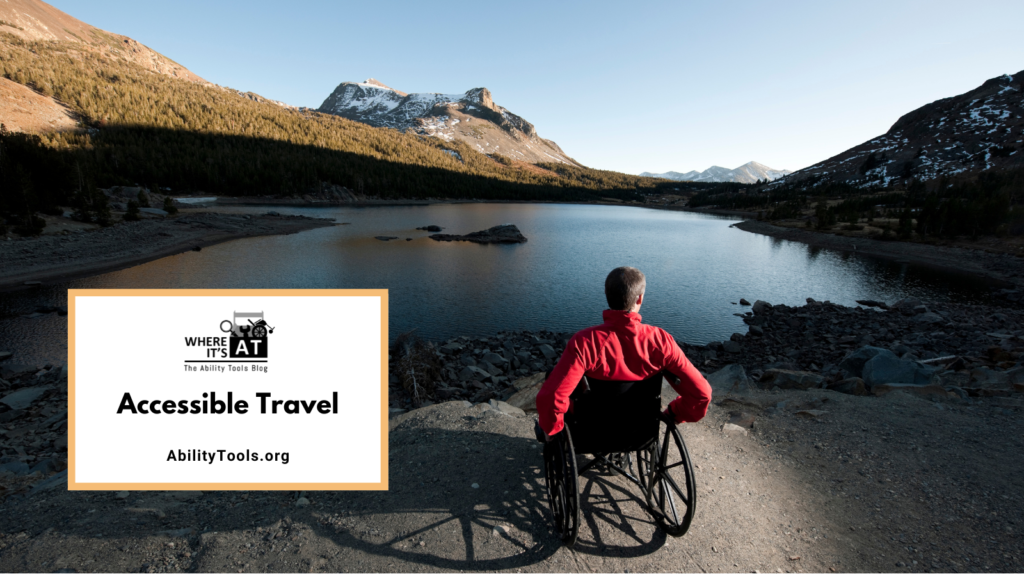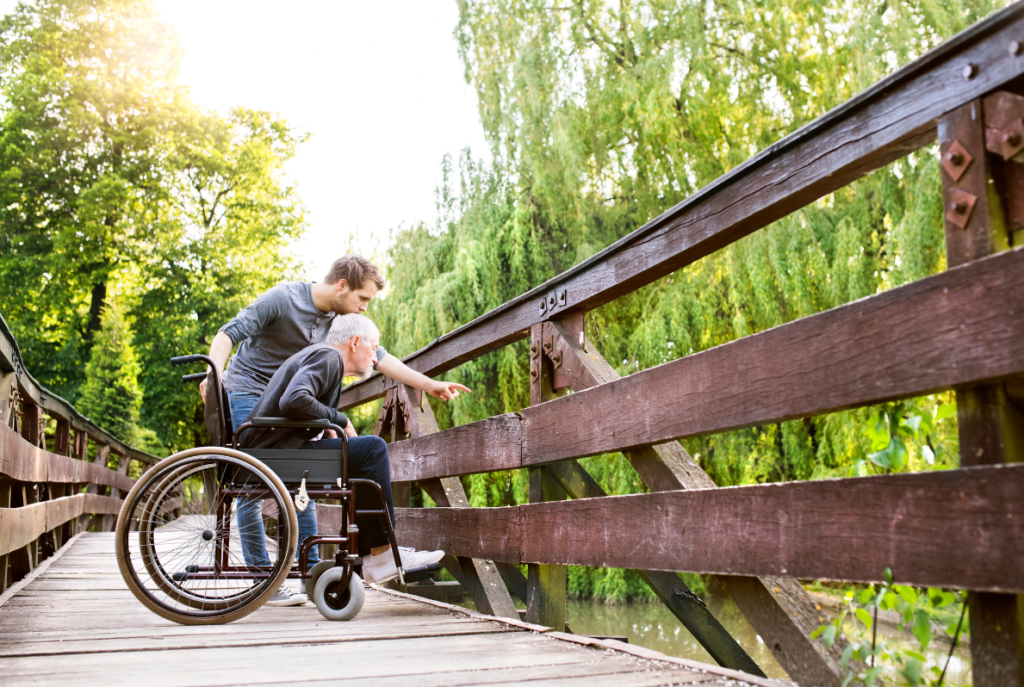One could say traveling is a necessity in life. When traveling, we learn about new places, spend time with loved ones, and make memories to last a lifetime. Sometimes planning travel can seem stressful but fortunately, there are resources available to make planning travel simpler. Here are some tips for preparing for a trip:

Research Your Options
Having a well-established foundation of knowledge for all travel and activities will not only ease your mind but make the trip a breeze.
IAccessLife App is an application that allows people with disabilities to share their experiences to inform others by rating and reviewing businesses and venues based on their accessibility. The app allows users to rate the location’s entrance, bathroom, parking, and interior. This app is a great resource to determine accessible places to go during a trip. While exploring, users can upload pictures and share tips for others to understand what is available to them. Ultimately, sharing our knowledge helps build up our community with information as the foundation. IAccessLife is available on the App Store and Google Play
Check out this TikTok where @sarahtoddhammer gives an example of when she used the IAccessLife app.
Another great online resource is Accessible GO. This website has a variety of features that provide accessibility information. The online city guides provide in-depth information on attractions, equipment rental, transportation, tour companies, and caregivers in a variety of different cities in the United States. They even have preplanned 24-hour itineraries for each of these cities. The accessible hotel search makes it simple to see all hotel options and prices in your desired city. The endless number of blogs the AccessibleGO staff writes highlight all things travel. Reading through these blogs could spark some ideas for your next vacation. Lastly, there is a community section where people can ask questions and share resources with one another. Overall, this website is a great tool to gain more knowledge and plan trips to potential travel locations.
The Ultimate Wheelchair Accessible Travel Destinations is a great resource to explore options in different cities as a wheelchair user. This guide has a list of accessible cities in the United States, Canada, Africa, the Middle East, Asia, Europe, and South America. After selecting a city, you can choose to read more about airport accessibility, attractions, hotels, public transportation, wheelchair taxis, sidewalk accessibility, and visa requirements. The guide then explains the accessibility options in depth. This is a great resource to research what is available in your desired destination.
Researching the accessibility level can also help you determine the assistive technology that would be most useful to you. You are able to determine if a Solax Transformer Scooter , a foldable walker, or a foldable wheelchair would be beneficial to your trip. Some medical equipment is also made for travel such as Mini CPAP Machine and Portable Oxygen Concentrators.
Book Accommodations in Advance
Planning the transportation and lodging so that it is all accessible is always crucial when traveling. There are agencies that will do the planning for you. Wheelchair Escapes is a travel agency that specializes in planning travel for people with disabilities. They plan vacation destinations around the world. Their goal is to provide a “hassle-free” travel experience by helping with flight preparation, excursion planning, and even assistive technology location. Watch this video where Kristy Lacroix, the founder of Wheelchair Escapes, explains more about how Wheelchair Escapes works.
Transportation
There are also resources that share a lot of useful information. This blog on car rentals for people with Dwarfism shares tips and tricks for those wanting to rent a car through a company.
Medication restrictions can be a big concern during travel. Research the laws related to medicine in the state or country you are entering and leaving from. The CDC has recommendations for traveling abroad with medicine. Weekly pill organizers can be used to easily organize medications while traveling.
Lodging
Booking hotels in advance to ensure an accessible room is necessary when going on a trip. Most hotels have wheelchair-accessible rooms and hard-of-hearing rooms. Some hotels even provide a lift in the pool.
Some features in wheelchair-accessible rooms usually are wider doors, handrails in the bathroom, roll-in showers, and assistance buttons. Also, all items will be lower than they typically would be. This TikTok by @spintheglobe explains what wheelchair users look for in an accessible hotel room.
Hard-of-hearing rooms have visual cues for those with disabilities that relate to their hearing. The room could include functions like bright flashing lights when there is someone at the door, the phone is ringing, a fire is detected, or when the alarm clock is set. Often, these rooms also have a TTY phone which vibrates and allows the person to type their message.
Useful AT to Take Along
Not only is it important to plan transport and hotel stays, it is also a good idea to plan excursions ahead of time as well. This is where research is crucial. Most excursions will have accessibility options. Some examples are the majority of theme park accessibility including a line pass program and wheelchair rental and hiking accessibility including resources like AllTrails. You might also want to consider devices like a columbus talking compass or trekking poles.
Don’t forget to research and plan any gadgets that could be useful while traveling. Here are some recommendations from our team:
While planning, you might come across other assistive technology that would be helpful during the trip. Device Lending and Demonstration Centers (DLDC) can loan assistive technology for up to 30 days. This could be a great alternative for purchasing equipment you may not always need. To search for available equipment, visit NATADS Public Access.
Follow Up on Your Plans
After doing research, and booking accommodations, you should always call for any questions that are still left. However, it is also important to call ahead and double check any accommodations that have already been booked. For example, calling the hotel to make sure your accessible room is guaranteed.
Know your Rights
Knowing your rights is just a step in the right direction to being able to correctly advocate for yourself when needed. Not everyone will know your rights but as long as you do, you will become a stronger advocate for yourself.
Preboarding is useful to board the plane with ease and ensure your needs are met during the plane ride. According to federal law, preboarding for self-identifying passengers with a disability who need extra time to board, be seated, or put away assistive technology is required by airlines. Preboarding can be requested when purchasing the ticket online or at the ticket counter during check-in. Documentation proving a disability should not be required for this airline benefit, self-identification should suffice. If a passenger feels like they have been treated unfairly, they are able to submit a complaint to the Department of Transportation. Check out this article to learn more about airline preboarding.
The Americans with Disabilities Act (ADA) “is a federal civil rights law that prohibits discrimination against people with disabilities in everyday activities.” It was created to protect people with disabilities from being treated poorly because of their disability. There are sections on state and local government services, public transportation, businesses, and more.
The Air Carrier Access Act (ACAA) prohibits discrimination based on a person’s disability on airline travel. It applies to all flights flying in and from the United States. The Airline Passengers with Disabilities Bill of Rights is a complete summary of a passenger’s rights. There are topics on assistive technology, service animals, and more. Within each topic, there are in-depth explanations about available procedures and accommodations.
For more information, check out this blog by Victor Mendoza on Where It’s AT team to learn more about accessible air travel.
Be safe and happy traveling!












